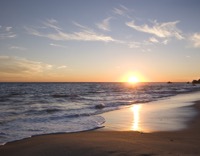Beach
Origin
(denoting shingle on the seashore): perhaps related to Old English bæce, bece‘brook’ (an element that survives in place names such as Wis bech and Sand bach), assuming an intermediate sense ‘pebbly river valley.’
Definitions
- 1:a pebbly or sandy shore, especially by the ocean between high- and low-water marks.
- verb
- 1:run or haul up (a boat or ship) onto a beach: at the water's edge a rowboat was beached
- 2: (often as adj. beached) cause (a whale or similar animal) to become stranded out of the water.
- 3: (of an angler) land (a fish) on a beach.
Description
A beach is a landform along the coast of an ocean, sea, lake or river. It usually consists of loose particles, which are often composed of rock, such as sand, gravel, shingle, pebbles, or cobblestones. The particles comprising a beach are occasionally biological in origin, such as mollusc shells or coralline algae.
Some beaches have man-made infrastructure, such as lifeguard posts, changing rooms, and showers. They may also have hospitality venues (such as resorts, camps, hotels, and restaurants) nearby. Wild beaches, also known as undeveloped or undiscovered beaches, are not developed in this manner. Wild beaches can be valued for their untouched beauty and preserved nature.
Beaches can be popular on warm sunny days. In the Victorian era, many popular beach resorts were equipped with bathing machines because even the all-covering beachwear of the period was considered immodest. This social standard still prevails in many Muslim countries. At the other end of the spectrum are topfree beaches and nude beaches where clothing is optional or not allowed. In most countries social norms are significantly different on a beach in hot weather, compared to adjacent areas where similar behaviour might not be tolerated and might even be prosecuted.
In more than thirty countries in Europe, South Africa, New Zealand, Canada, Costa Rica, South America and the Caribbean, the best recreational beaches are awarded Blue Flag status, based on such criteria as water quality and safety provision. Subsequent loss of this status can have a severe effect on tourism revenues.[1]
